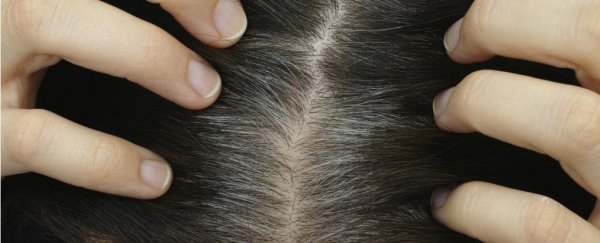Greying has long been associated with too much stress and ageing, but is there any truth to the idea that extra worries and responsibilities can change the colour of our hair?
The short answer is… it's complicated. While stress can certainly make a physical mark on our bodies, when it comes to greying, scientists are still figuring out what causes it, and research suggests that are several factors that influence the amount of silver on the top of your head.
Our hair gets its colour from cells known as melanocytes, which add pigment to the strands being pushed up through the scalp by the tiny organs known as hair follicles. What happens when we age is that the melanocytes grow weak and die off, which means our hairs are no longer getting the same 'paint job'.
This damage is referred to as oxidative stress, and it occurs in all the cells in our bodies as a natural part of the ageing process - not because of the stress of looming deadlines or exams.
When our bodies get older and can no longer fight off particular types of harmful molecules as effectively as they do in our 20s and 30s, oxidative stress kicks in, and our hair can show the effects.
So that's the natural greying process, but can emotional stress play a role in the onset of oxidative stress, thereby indirectly causing grey hair?
Without a wide-ranging study putting a large group of people under a prolonged period of artificial stress - not the kind of research that would get a lot of backing from ethical scientists - it's hard to prove a definitive link.
And while severe bouts of stress have been connected to oxidative stress in the past, the evidence for a link isn't particularly strong - certainly not strong enough to break the consensus among scientists that most stressful situations won't directly cause your hair colour to change.
"Stress is more likely to cause hair loss and to increase shedding rather than cause greying," dermatology consultant Miri Seiberg from the Global Dermatology Institute in Florida told Kate Horowitz at Mental Floss.
So forget worrying about premature greys - if you're in a stressful situation, you've got much bigger hair-related concerns to consider, with studies suggesting that major or prolonged worries can interfere with the biological processes that govern hair growth and cause it to fall out more easily.
But there are hints of something else going on.
Back in 2007, researchers from Harvard University suggested that regularly being stressed-out could speed up the greying process, because stress can produce highly reactive molecules called free radicals that mess with melanin production.
"We've seen that people who are stressed [for] two to three years report that they turn grey sooner," physician Tyler Cymet told Coco Ballantyne at Scientific American.
But that was an extremely small study, and we're still waiting on conclusive evidence for their hypothesis.
Some experts have also made the distinction between psychological stress and emotional stress, but because these conditions come bundled with a host of other effects on the body, it's difficult to trace a definitive link between how stressed you are and what's happening in the follicles on top of your head.
We're learning more all the time, though. Earlier this year, scientists in the UK identified a gene called IRF4 that was linked to grey hair, suggesting that some of us are more predisposed to going grey than others. But the team emphasised that there are a range of other environmental factors involved as well.
Those factors include smoking, being exposed to air pollution, and not getting a good diet - all things to avoid if you want to maximise your chances of keeping your hair colour for as long as possible. And it's probably a good idea to try and relax too… just in case.
